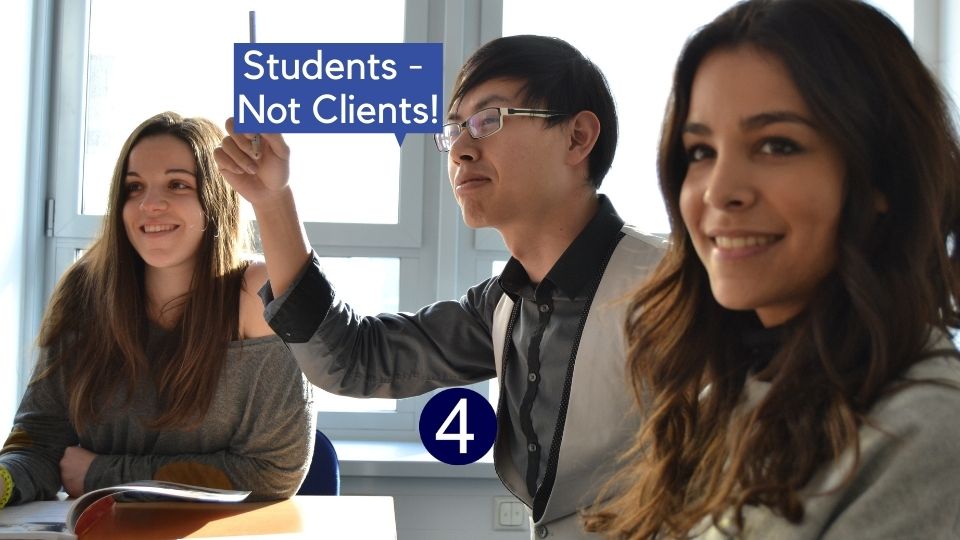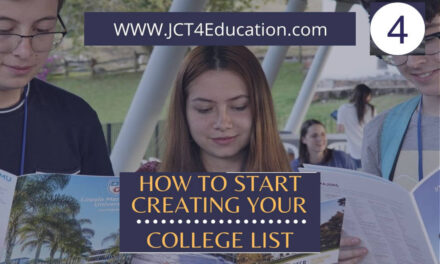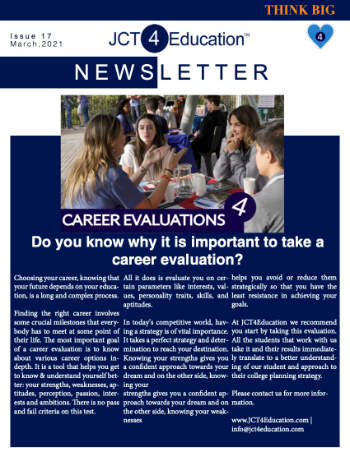There is a conversation of great importance that is not taking place in the higher educational community today. The missing dialogue concerns the label “clients,” a term we have borrowed from the corporate world and have affixed to college applicants, their families and those currently enrolled in universities. Our principal view from beginning was: Students not clients.
Without much resistance, our community has quickly grown accustomed to using this word in place of “students,” thereby appropriating the language of consumerism for the educational sphere. When faced with arguments in favor this relatively new change in lexicon, however well intentioned they may be, we should be highly critical. The term “client” negates the dignity and true essence of the roles of each person who comprises the educational community: educator, consultant, administrator, parent and student alike.
It is imperative to the integrity of the entire community that we not passively acquiesce to using the word “client,” but instead that we actively resist this misuse of language by restoring the words “student” and “family” to our lexicon.
Students Not Clients – All about College Planning
Students not clients – What does it mean for us
The word “client” used in reference to students and their families came into vogue during the 1990’s. The broad rationale was that since students and their families are paying for education either directly or indirectly through taxes, or both, they are customers; consequently educators and administrators should be viewed as providers. In this framework, education becomes a simple market equation. It replicates a business model in which customer or “client” satisfaction is key. Those in favor of this consumerist model argue it is exactly the way education requiring any form of payment or tuition ought to be; a person is presumably purchasing knowledge, skills and ultimately degrees or other accreditations from providers, i.e. educators and the institutions with which they are affiliated; therefore, the success of this transaction can be determined by evaluating the satisfaction of the purchaser, i.e. client or customer. Ultimately, the question is simple: Do we believe that subjective gratification as reported by students is the marker by which we should judge educators, educational institutions and those tasked with running them? Or do we trust that there are higher principles guiding education than, say, a “five star” rating on a college freshman’s instructor evaluation?
The education-as- business construct, and the language that has followed, is negated by the wisdom of millennia of educators who precede it. One such educator was John Dewey, who wrote in his book, Experience and Education (1938):
There is, I think, no point in the philosophy of progressive education which is sounder than its emphasis upon the importance of the participation of the learner in the formation of the purposes which direct his activities in the learning process, just as there is no defect in traditional education greater than its failure to secure the active cooperation of the pupil in construction of the purposes involved in his studying.

The word “client” does not convey the humanity, effort and growth that define students—the very centerpieces of Dewey’s conception of progressive education. Unlike a “client,” a “student” is responsible for earning his or her education. This truth applies not only in the classroom, but also when students and college applicants seek guidance and tutelage from private counselors, advisers, tutors, and educational consultants.
College Planning: Students Not Clients @JCT4Education
These professionals facilitate learning by helping students hone the skills, ideas and strategies needed to produce effective college applications and improved academic performance. They do not provide a “client” with a good or quantifiable service, such as a handing them a pre-written or plagiarized college application essay or negotiating with a high school students’ biology teacher for a higher grade.
Parents and other guardians play a crucial role in students’ education. They often finance tuition and other college costs, which are undeniably significant; higher education can be a sizeable and burdensome expense to the family budget. However, most families’ contributions extend way beyond finances.
Parents and other caregivers instill the essential values that allow students to thrive academically: motivation, dedication, self-respect, intellectual curiosity, creativity and perseverance. They often make sacrifices of time, talents and resources to support their children in developing academic and other talents and exposing them to educational opportunities that extend far outside of the classroom.
To lump students’ families under the umbrella of “clients” is to ignore all of the devotion, character building and at-home learning that has empowered children as learners and thinkers. Labeling families as “clients” transforms the family members solely into payers—writers of checks—in the educational equation.
College Planning: Students Not Clients @JCT4Education
It ignores the wealth that lies in the nurturing, advising and other formative experiences that they have bestowed upon their student family member. While the financial expenses of education are very real, the non-financial means of family support for students should never be diminished, let alone ignored. Students’ caregivers can, and often do, serve as the bedrock upon which students’ academic successes rest.
Calling students “clients” demeans not only students and their families, but educators as well. The use of the term “clients” in reference to students implies that educators are merely “service providers,” which obscures the quality and value of the education they impart to students.
Were doctors required to refer to their patients instead as “clients,” both medical practitioners and patients would feel misunderstood and demeaned—and rightfully so. Just as doctors would surely resist this alteration of the traditional language within their occupation, educators should reflect upon the detriment of the term “client” in place of “student” in their professional sphere.
The word “client” is unclear and misleading in an educator-student relationship, because it ignores the mutual respect, effort and collaboration that defines the partnership between the two. Education is not a simple consumer exchange; educators do not offer a specific good or quantifiable service in exchange for money, nor can a true education be bought. Educators share wisdom, mentorship and guidance, essential tools that students use to develop skills, grow and explore as they venture through their education.
College Planning: Students Not Clients @JCT4Education
The use of the terms “students” and “families” in place of “clients” conveys due respect and appreciation for all parties involved in an educational context. Therefore, it is essential that we restore this commonsense terminology to the entire field of education. Using proper language will promote a deeper sense of responsibility and engagement in students regarding their own education.
In addition, this seemingly semantic change will bring into focus educators’ commitment to leadership, mentorship and instruction as opposed to misrepresenting them as providers in a service industry—a realm that education is not, and ought never become.
Any thriving educational institution is founded upon respect for educators, administrators, students and staff, the institution’s history and traditions, and the community it serves. For all members of the educational community, naming students and their families what they truly are is essential to cultivating the dignified, mutual relationships through which all meaningful educational experiences can flourish.
College Planning: Students Not Clients @JCT4Education
Do you need professional support in preparing for your studies?
Planning services include high school curriculum planning, referrals for psychological testing, guided research on careers and majors, building college lists, and campus visit advice.






